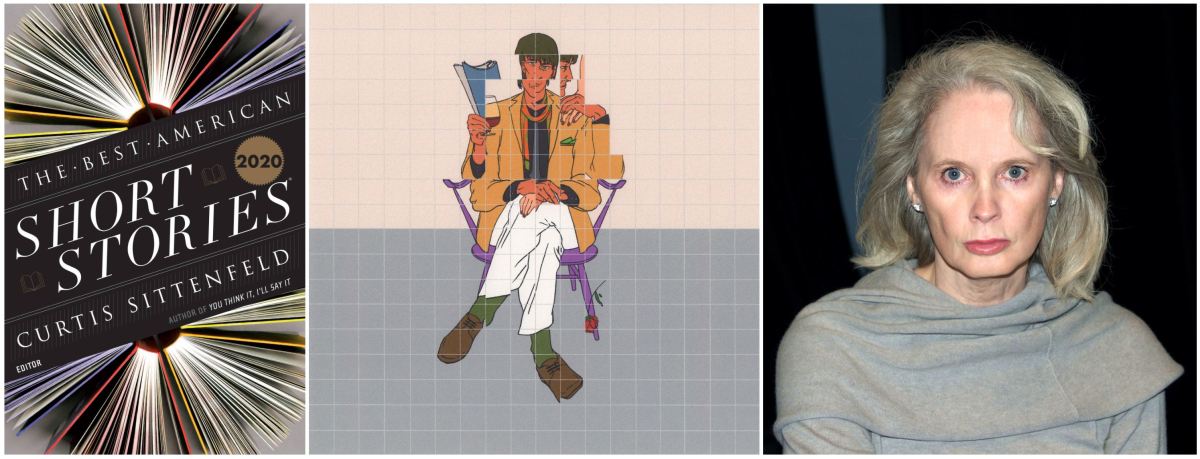by James Wallace Harris, Saturday, December 5, 2020
Menu: The Best American Short Stories 2020 Project
“This Is Pleasure” by Mary Gaitskill is the kind of cutting edge short story I expected to find in The Best American Short Stories 2020 (BASS2020). It is the longest story in the anthology by audiobook time. The New Yorker called it a novella for its online publication.
“This is Pleasure” are twin monologues by M and Q which switch back and forth to provide a kind of trial on sexual misconduct. Q is Quin, or Quinlan M. Saunders a middle-aged senior book editor accused of sexual misconduct by a number of women who have forced him out of his successful profession. M is Margot a close woman friend who believes Quin’s words and actions were stupid, but not evil enough to ruin his career.
Mary Gaitskill sets up the story so we can judge Quin for ourselves and she presents a fascinating conundrum of a case. Probably all men are on the #MeToo spectrum, but at what points along that spectrum do men deserve increasing levels punishments? Our legal system decides if a person should go to jail, but it’s the court of public opinion that often creates other kinds of punishments. And in this story Gaitskill suggests that every woman must judge Quin for themselves.
Quin is an interesting character of contrasts. He’s happily married, and doesn’t want to upset his wife. Quin is entirely open to everyone about how he likes to flirt, which his wife either endures, excuses, or ignores. Quin has countless women friends, who put up with different levels of his shenanigans. He offers unlimited support, sympathy, encouragement, and is willing to listen to anything a woman friend needs to talk about no matter what time of day or night. Quin craves intimate information, loves to tease, flirt, flit around sexual issues, while trying to cop whatever feels he can get away with. Yet, Quin is always adamant that he’s not after an affair or real sex, or at least that’s what he tells everyone. Most women consider him creepy but some also consider him well-meaning, even supportive and caring.
However, Quin does cross lines. He believes he always stops if told to do so, and always respects whatever boundaries the women set. But does he? He’s hyper-aware of women needing friendship and freely provides whatever emotional support that’s needed, but he also thrives on crumbs of sexual titillation. Some women don’t begrudge him those crumbs, but others do. So how should we judge Quin. How does society solve a problem that walks the razor’s edge of ethicality?
The only actual solution I can think for cases like Quin, is for them to have a Creepy Friend Agreement for women to sign when they first meet. Sure, this is a Sheldon from The Big Bang Theory solution, and probably absurd. But this story seems to ask how Quin could have protected himself legally and still be himself. In the end, Quin hopes he can defend himself in court, desperately believing he can provide proof that his accusers consented to their strange relationships. From the corroborative evidence Margot presents, we don’t know if this is true or not. She thinks it might be, but it’s doubtful courts will. More than likely Quin is delusional, even with all his skills for reading women, it doubtful he can read them all.
“This is Pleasure” is short story writing at its best.
Other Reviews:
Karen Carlson concluded:
It’s a perplexing story, kind of frustrating, but compelling. It’s long – it’s being sold as a 96-page novella – but reads quickly, if emotionally. I was a bit nervous coming into this story, since Gaitskill has scared me in the past, and not in a fun way. But this was excellent, the kind of story that doesn’t change your life, doesn’t even clarify your thinking, but helps you outline some of the problems a little bit better. Uncertainty can be a good thing, if only because it gives you some breathing room while you’re looking for certainty.
Jake Weber spent a good deal of time evaluating the ethical problems brought up by the story, and admiring fiction for letting him do that:
Is it too didactic of me to turn literary analysis into rules for flirting in 2020? Is that too narrow a purpose, too pedestrian a use to make of art? I'd argue no, that in fact, one of literature's best uses is that it allows us to look at a difficult issue from the outside and analyze it. The best proof of this story's artfulness is how easily it can be turned to a non-artful use.


I’ve read some of Mary Gaitskill’s stories and enjoyed them. But do I want to read a 96 page story about sexual transgressions or do I want to read Kim Stanley Robinson’s THE MINISTRY FOR THE FUTURE? At this stage of my Life, it’s all about choices. Time is short, and decisions have to be made.
That’s a hard call. “This is Pleasure” is impressive for the writing. I’m afraid KSR can’t do that kind of writing. But then Gaitskill probably can’t speculate about the future like Robinson. I plan to read The Ministry for the Future” someday, but I was very glad I read “This is Pleasure.” If I had my druthers, I wish I could write like Gaitskill but tell science fiction stories like KSR.